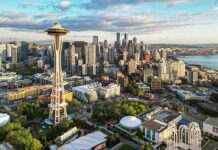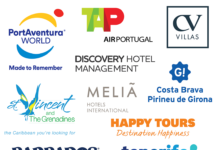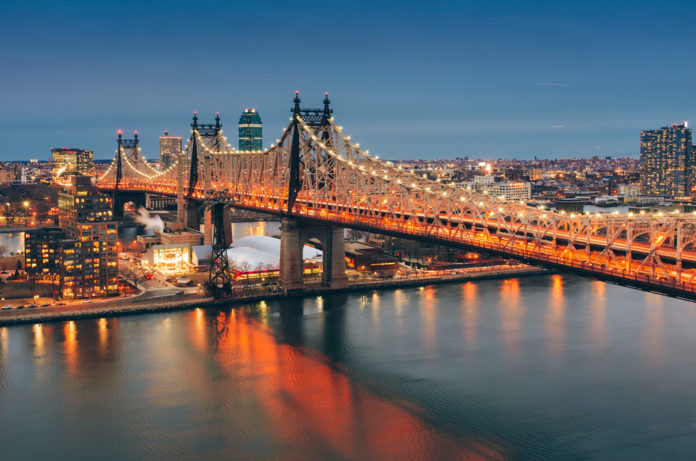
Spend A Day in Queens Enjoying Authentic Food From Around the World, Unique Arts and Culture Venues, Beautiful Beaches and Riverfront Parks With Stupendous Views
NYC & Company, New York City’s official destination marketing organization and CVB for the five boroughs of New York City, invites locals and visitors alike to explore Queens Like a New Yorker as part of the organization’s “Get Local NYC” initiative. For all there is to do and see in New York City, visit nycgo.com.
See world-famous tennis stars at the U.S. Open or a Mets game at Citi Field. Hit the beach in the Rockaways. Hop the subway to Jackson Heights or Flushing and enjoy food from around the world. Queens is also home to several major museums and arts venues, including the Museum of the Moving Image, Socrates Sculpture Park, the Noguchi Museum, MoMA PS1 and more.
“Queens holds the Guinness Book World Record as the most ethnically diverse urban area in the world, with at least 138 languages spoken,” said NYC Company President and CEO Fred Dixon. “For visitors, it’s a great place to experience New York City’s diversity, including authentic cuisine from cultures around the world. It’s also a great place to watch tennis legends play in the U.S. Open, travel back in time to the 1964 World’s Fair, or take a beach day at the Rockaways. Whether you want to visit the home of jazz great Louis Armstrong, see contemporary art at MoMA PS1 or enjoy a night out at a bar or brewery, Queens is the ultimate destination.”
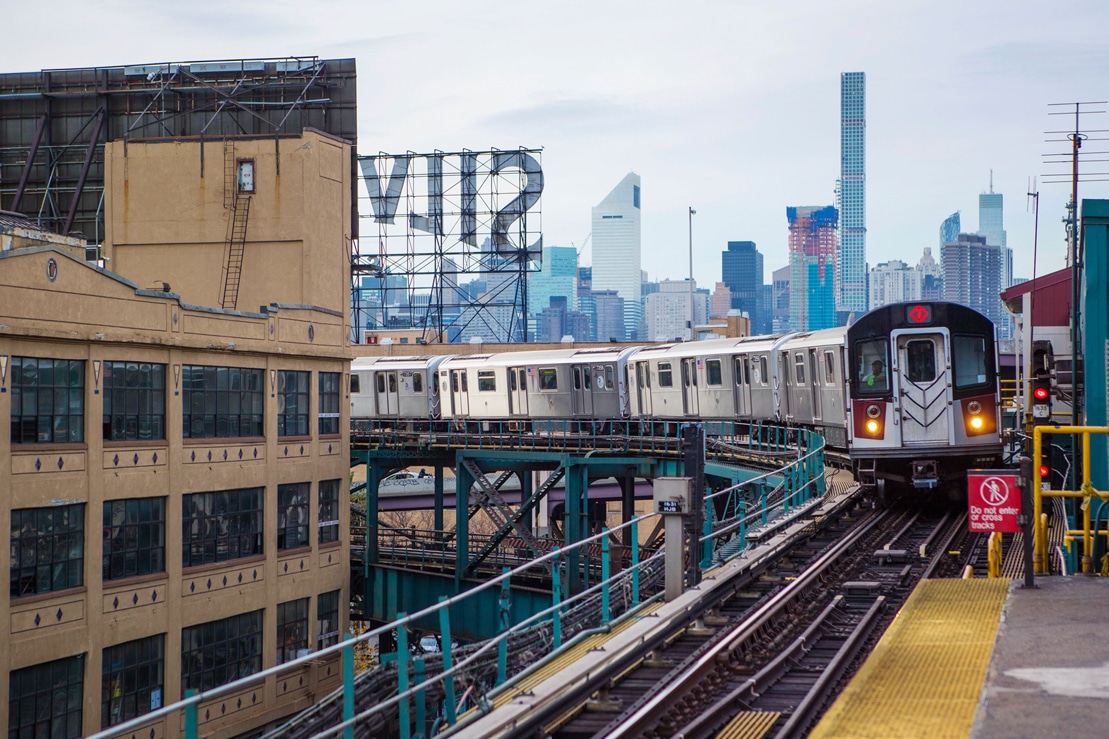
Planes, ferries, buses and trains: There are so many ways to get to Queens.
Hop on the No. 7 subway line to experience Queens. Take the train from Times Square, Fifth Avenue or Grand Central to Court Square to visit MoMA PS1 in Long Island City. Use Jackson Heights-Roosevelt Avenue stop to explore Latin American and Asian eateries and businesses. For Mets games or the U.S. Open, take the 7 to Mets-Willets Point. And for Asian food, shopping and New York City history, stay till the last stop in Flushing. The N and W lines serve Astoria, the A train goes to Rockaway, and the M, R and F lines go to Forest Hills and Jamaica.
Flying to LaGuardia or JFK airports in Queens, taxis, rideshares and express buses are available to and from the airports. For $5, the AirTrain takes passengers from the A line’s Howard Beach-JFK station to JFK Airport. For public transit to and from LaGuardia, take the Q70 LaGuardia Link bus from the Jackson Heights or Woodside stations on the No. 7 subway line.
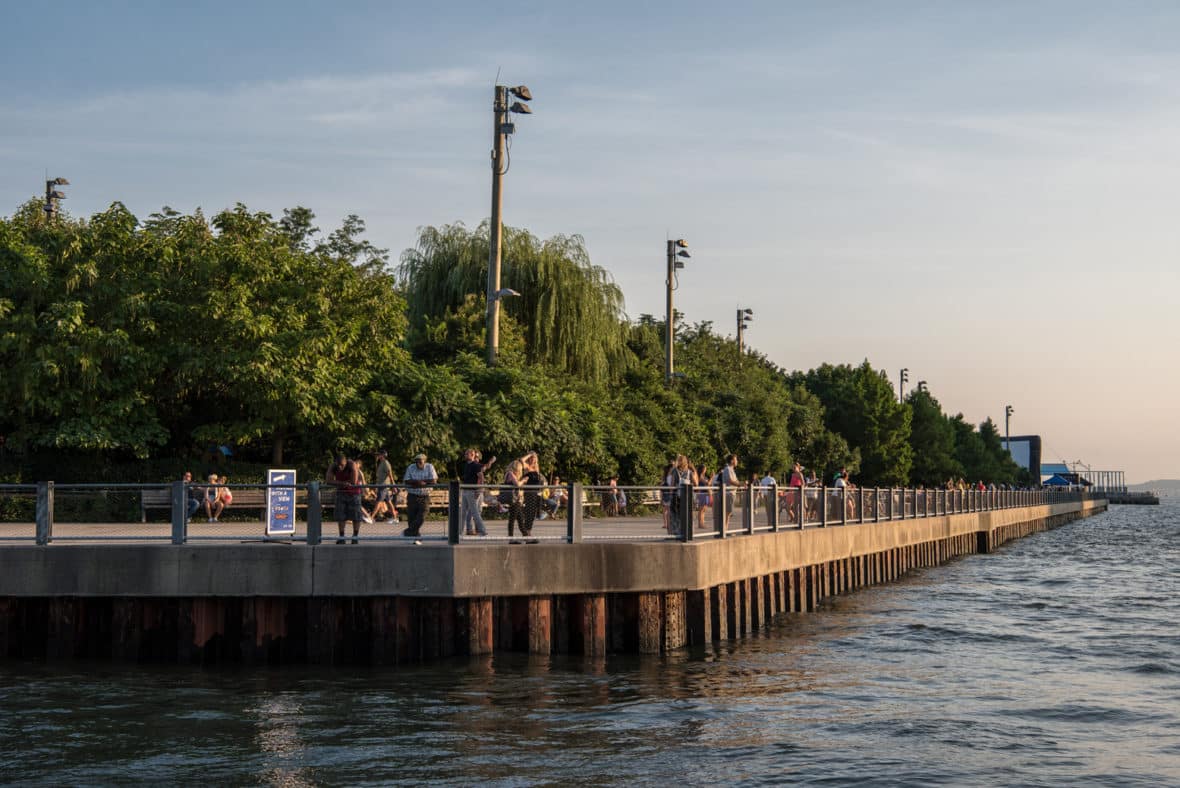
Several NYC Ferry routes serve Queens from Manhattan and Brooklyn for just $2.75 each way, with stops in Long Island City, Astoria and Rockaway.
Queens has over 100 hotels from major brands like Holiday Inn, Hilton and Marriott, to boutique hotels like the Collective Paper Factory in Long Island City or Rockaway Hotel + Spa, billed as an urban beach getaway. A number are located within a mile or two of the airports. One of the city’s most popular hotels is onsite at Kennedy Airport: the TWA Hotel, housed in the landmark Eero Saarinen–designed flight center. Watch jets taking off from the TWA Hotel’s rooftop pool!
Queens has 91 neighborhoods, more than any other borough. At 109 square miles, it’s also the largest of New York City’s five boroughs. Below are some highlights and attractions.
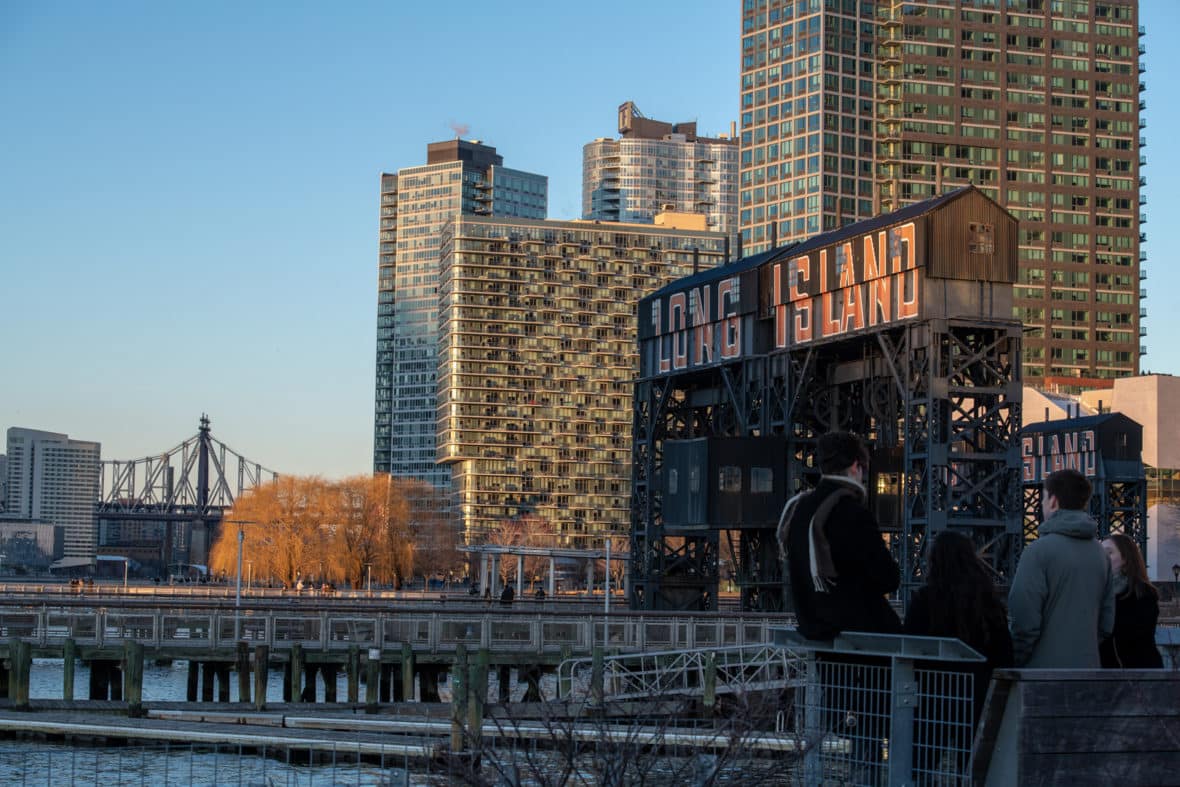
The ferry to Long Island City leaves passengers by Gantry Plaza State Park, a 12-acre waterfront oasis with stunning views of Manhattan across the river.
MoMA PS1 is one of the country’s largest contemporary art institutions and an affiliate of Manhattan’s Museum of Modern Art. In addition to exhibitions, MoMA PS1 hosts performances and concerts and has an onsite Greek restaurant.
Culture Lab LIC is an arts and culture hub presenting art of all genres, while supporting New York artists and other nonprofits by providing space, resources and a sense of community.
Astoria is known for authentic Greek food, with popular spots like Stamatis Restaurant, Telly’s Taverna, Taverna Kyclades and Agnanti. However, the neighborhood is also home to three unique arts venues.
The Museum of the Moving Image is dedicated to the history of film, television and digital media. Its collection includes vintage film equipment; costumes and props from famous movies and shows; video games and other interactive activities, and exhibitions about popular shows like “The Walking Dead,” plus screenings and an ongoing exhibition devoted to Muppets puppeteer Jim Henson. To get to the museum by subway, take the R or M to Steinway Street or the N or W to 36th Avenue.
Socrates Sculpture Park hosts large-scale contemporary artworks and multimedia installations in an outdoor waterfront park near the Astoria ferry stop. Across the street, the Noguchi Museum showcases work by the Japanese American artist Isamu Noguchi in what was originally his home and studio.
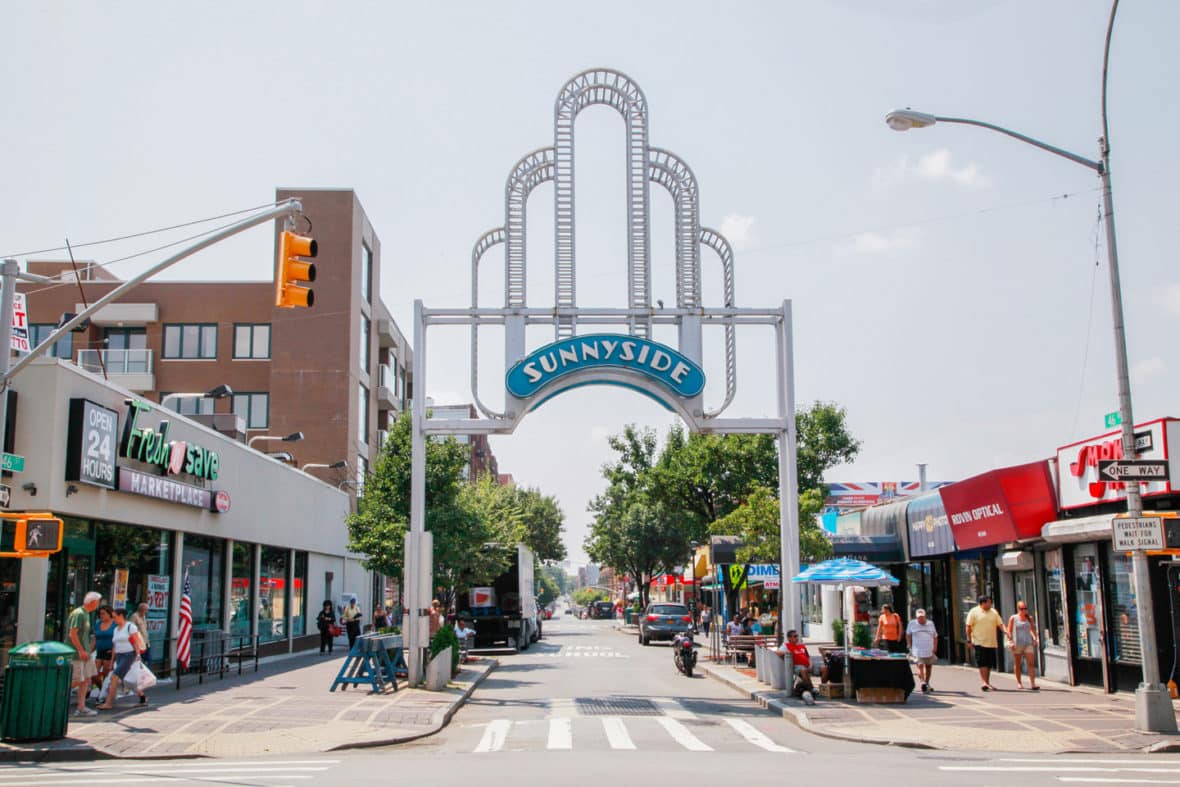
SUNNYSIDE, JACKSON HEIGHTS AND EAST ELMHURST
One of the first stops as the 7 train heads into Queens is Sunnyside’s 40th Street-Lowery Street station. Try Nita’s European Bakery, Alewife Brewing and Thalia Spanish Theatre, which hosts live performances in English and Spanish.
Next stop on the 7 train: Jackson Heights-Roosevelt Avenue. Two-thirds of Jackson Heights residents are foreign-born, and they’ve turned it into a culinary paradise with eateries from around the world. Jackson Heights is also home to one of the City’s largest LGBTQ+ communities.
Gay bars and clubs in Jackson Heights include Friends Tavern; Hombres Lounge; and the Latin gay clubs True Colors and New Club Evolution. Queens Pride House, an LGBTQ+ community and cultural centre, is located in Jackson Heights, and the neighborhood also hosts the annual Queens Pride Parade.
Jackson Heights has a historic district as well, preserving Tudor, Romanesque and Renaissance garden apartment buildings. A unique sign in the historic district honours Alfred Mosher Butts, who invented Scrabble there in 1938. The street sign at the corner of 81st Street and 35th Avenue is designed to look like a set of Scrabble tiles, with a numerical value shown for each letter in the word “Avenue” and the “th” in “35th” (The sign is worth 14 Scrabble points.)
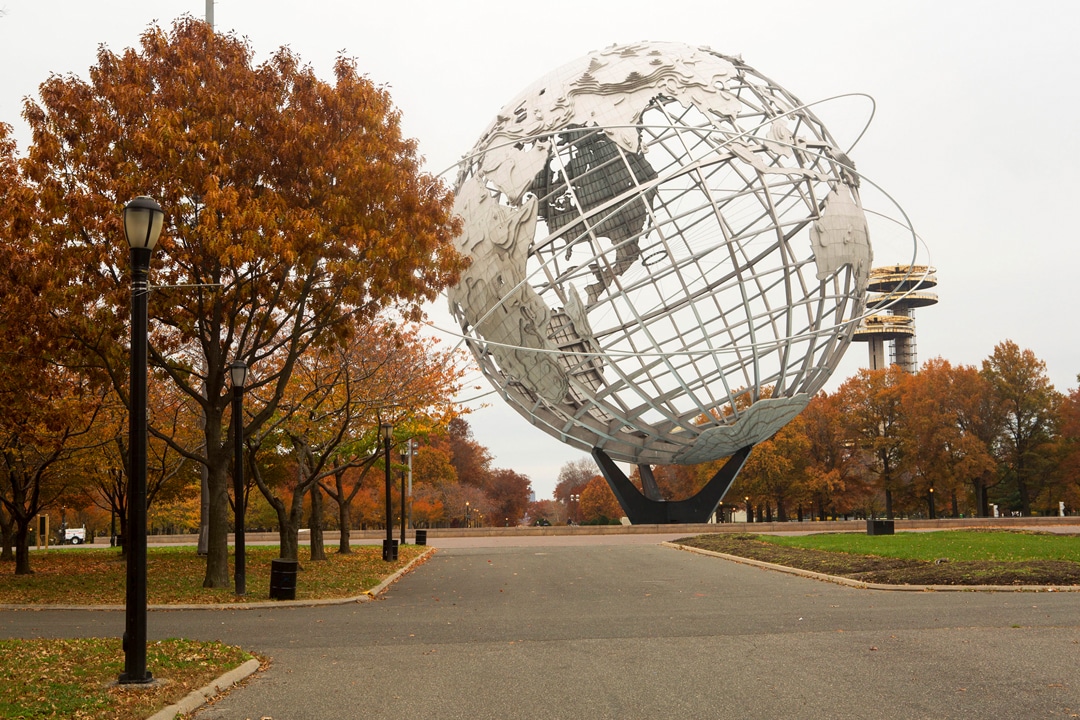
Take the 7 train to the Mets-Willets Point station to reach Flushing Meadows Corona Park, the Billie Jean King National Tennis Center, and Citi Field, where the Mets play baseball. The tennis stadium is not only an amazing place to catch rising stars and world-famous legends at the U.S. Open — but it’s a great place to eat.
The World’s Fair opened in Flushing Meadows Corona Park in 1964, and many Queens landmarks and institutions located in and near the park are connected to the fair. Two 100-foot-tall NASA rockets stand outside the New York Hall of Science. The Unisphere, a 12-story steel globe that was built for the fair, has become an icon of Queens and New York City. The globe has been featured in movies like “Spider-Man: Homecoming,” “Men in Black” and “Iron Man 2.”
The Queen’s Museum is housed in a building that dates to the 1939 World’s Fair. Its most famous display, the “Panorama of the City of New York,” is a scale model of the city that debuted at the ’64 fair. The panorama, updated in 1992, includes models of every building built before 1992 (nearly 900,000 in total), along with every street, park and bridge, on a scale of 1 to 1,200. The island of Manhattan is 70 feet long, the Empire State Building 15 inches tall.
Flushing Meadows Park is also home to a zoo, a vintage carousel, and the Playground for All Children, one of the first outdoor playgrounds designed to accommodate children with disabilities. On certain Saturday evenings in spring, summer and fall, the park hosts the Queens Night Market, featuring mom-and-pop vendors selling homemade food from around the world. The Queens Botanical Garden is nearby too.
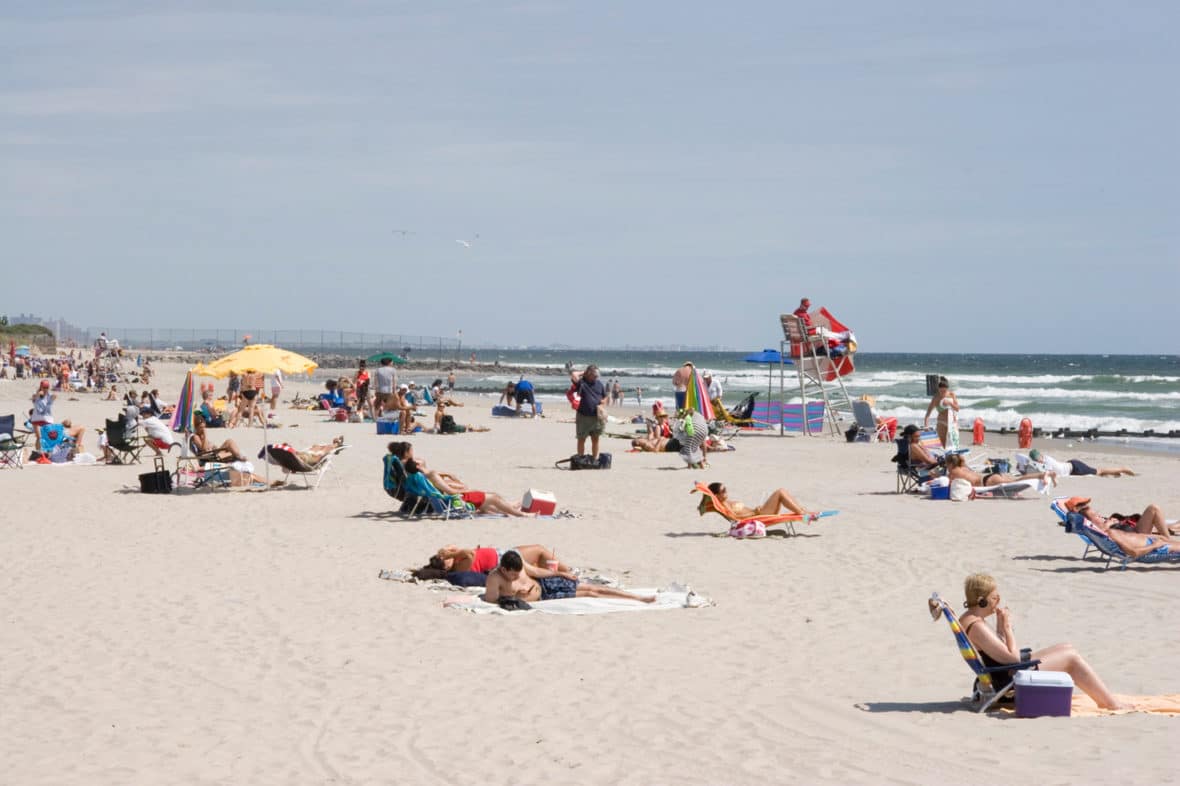
ROCKAWAY, JACOB RIIS PARK, AND JAMAICA BAY WILDLIFE REFUGE
When New Yorkers want to get away from it all without leaving the city, they often head to Rockaway. This peninsula on the Atlantic Ocean is 5 and a half miles long but just a few blocks wide; it’s famous for big waves, surfers and a small-town vibe.
Rockaway was hard hit by Superstorm Sandy in 2012, but the ocean boardwalk has been rebuilt and its beaches attract millions of visitors each year. Designated surfing areas are located at Beach 68-71 streets, Beach 87-91 streets, and Beach 110-111 streets; it’s fun to watch the surfers catching waves and lessons are available for newcomers. Mom-and-pop vendors serve up great food in concession areas on the beach and on the neighbourhood’s side streets. Popular dining spots include the Bungalow Bar, Uma’s and Rockaway Beach Surf Club.
To get there, take the A train or a ferry. The hour-long trip by boat from Wall Street in Manhattan is just $2.75 (the price will increase to $4 beginning September 12) and comes with spectacular views of Lower Manhattan, Coney Island, and even the occasional pod of dolphins frolicking in the open water. The boat also picks up passengers in Brooklyn. The ferry docks on the bay side of the Rockaway peninsula, and from there it’s a short walk along 108th Street to the ocean beaches. Ferry service ends early in the evening, so pay attention to the schedule for return trips.
Street parking in the Rockaways is limited during beach season, but there’s a large paid parking lot at Jacob Riis Park on the southeastern side of the peninsula. Riis is part of Gateway National Recreation Area, so it doesn’t have the neighbourhood feel or local streets found elsewhere in the Rockaways, but it does have a beautiful beach and fantastic food vendors. Riis can also be reached by a free shuttle bus from the Rockaway ferry drop-off site, or via the Q35 bus or Q53 to the Q22 bus.
The Jamaica Bay Wildlife Refuge is also part of Gateway National Recreation Area. It’s located on an island connected by bridges to the Howard Beach section of Queens on one side and to Rockaway on the other. More than 300 species of birds have been spotted at the wildlife refuge. There are hiking trails, activities led by park rangers, and ponds for hand-paddled watercraft. To get there by public transit, catch the Q53 bus to Cross Bay Boulevard-Wildlife Refuge or take the A to Broad Channel.
Visitors to Riis, Rockaway and the wildlife refuge can also take advantage of bike lanes and multi-use paths for bikers, skaters and pedestrians. Look for the red and green routes on the National Park Service Jamaica Bay Greenway map or consider doing all or part of an 18-mile bike loop around the area that includes an adjacent section of Brooklyn.
REGO PARK AND FOREST HILLS
Some 50,000 Bukharian Jews from Uzbekistan, Tajikistan and Turkmenistan have settled in Queens in the last few decades, mostly in Rego Park and parts of Forest Hills. That led to a new nickname for the area: Queensistan. It’s also given rise to well-regarded eateries like Shashlichnaya Restaurant and the Rokhat Kosher Bakery. Elsewhere in Rego Park, Knish Nosh is famous for its knishes; Andre’s Hungarian bakery is across the street. The M and R trains stop at 63rd Drive in Rego Park.
Just east of Rego Park, Forest Hills has several pop-culture claims to fame. Spider-Man fans may recall that Peter Parker lived in Forest Hills; the Beatles played Forest Hills Stadium in 1964. The stadium still puts on a full schedule of events, with upcoming concerts by Death Cab for Cutie and the Yeah Yeah Yeahs, along with a show called “The Big Climate Thing” featuring Haim, The Roots, Sheryl Crow and more.
Members of the legendary punk rock band The Ramones met at Forest Hills High School. A mural depicting the band can be seen on the Thorneycroft Ramp between 66th Road and 66th Avenue near 99th Street.
RIDGEWOOD
Gottscheer Hall has been serving German food and beer in Ridgewood for nearly a century, but newer businesses reflect its growing Latino community, including Pupusas Ridgewood (Salvadoran stuffed tortillas); Cachapas y Mas (Venezuelan street food); the Dominican-owned eateries Cafe Moca, Listo El Chimi and Chiquita’s; Super Pollo (Ecuadoran rotisserie chicken); Las Chilangas (Mexican); and Tequila Time, a bar and restaurant that’s women-led and LGBTQ+-friendly. Small businesses in the area include Stay Forever (gifts, accessories and jewellery) and Deep Cuts record store. Take the M train to Forest Avenue or the L to Myrtle-Wyckoff.
RICHMOND HILL
Little Guyana, an ethnic enclave in Queens, is located in Richmond Hill and Ozone Park. It is also home to many New Yorkers with roots in Trinidad and other parts of the Caribbean. Try Little Guyana Bake Shop, Trini Delite Roti Shop, TrinCiti Roti Shop, Bakewell Bakery & Restaurant, Shivram’s Bakery and Sybil’s along Liberty Avenue and Lefferts Boulevard. Shops selling saris reflect the Indian heritage that many Guyanese and Trinidadian families have. Take the A train to the Lefferts Boulevard stop.
JAMAICA AND ST. ALBANS
The many Black-owned restaurants, shops and cultural spots in the Jamaica section of Queens speak to the neighborhood’s African American and Afro Caribbean identity. Caribbean food is on the menu at The Door, Genesis Restaurant, Bebe Fritay and Jamaican Flavors. Go meatless at DeeGee’s Vegan 360, or try the Soul Sundays menu at Burgers Tacos Wings & Seafood. For an evening out, visit Vibes, a lounge with good food and music. Check out Rotten Apple Wear for Queens-themed gear, and VP Records, a record shop and headquarters for a reggae-and-soca record label.
Soak up some history at the King Manor Museum and Rufus King Park, named for an anti-slavery advocate and signer of the U.S. Constitution. See what’s happening at Roy Wilkins Park which hosts events like the Jamaica Jerk Festival. Wilkins Park is also home to the Black Spectrum Theatre Company.
Jamaica has a substantial Bangladeshi community as well. Admire the jewelry, saris, and salwar kameez garments on display at Riwaz, and check out eateries like Ghoroa and Dhaka Sweets.
In the nearby St. Albans neighbourhood, take a walk around the beautiful Addisleigh Park Historic District, known for its early 20th century Tudor and neo-Colonial Revival homes. Many famous African Americans lived here, including Jackie Robinson, Lena Horne, Ella Fitzgerald and Count Basie.
For further information on exploring Queens, visit nycgo.com/queens.

